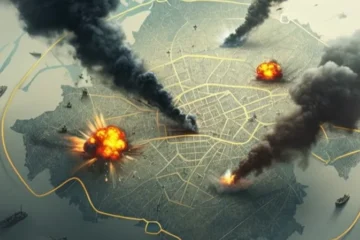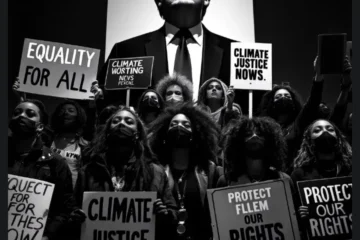Trying to make sense of the global actors involved in the Hamas and Israeli confrontation.
Rightly, global news is currently dominated by continuing acts of violence that have arisen during and following the Hamas attack on Saturday. This will continue, as the two main protagonists in this conflict, Hamas and Israel prosecute total War. The proliferation of Social Media posts, of real-time atrocities, permeates the global consciousness in a way unthought-of 15 years ago . These posts and images will continue to incite entrenched positions on both sides and make any peace negotiations an impossibility.
There are, however, many other actors involved in this tragedy, and to make some sort of sense of the situation it may be helpful to understand the background to their relationships.
Hamas has had a complex relationship with Iran. Iran has been a key supporter of Hamas, providing financial and military assistance. This support has been mainly motivated by their shared opposition to Israel. Iran sees Hamas as a valuable proxy in the Palestinian territories and the broader Middle East.
However, their relationship has also faced challenges. At times, political differences and regional dynamics have strained their ties. For example, during the Syrian Civil War, Hamas distanced itself from the Iranian-backed Syrian government, causing tension with Iran, which supported the Syrian regime.
The extent of their collaboration can change over time due to shifting regional dynamics and political considerations. The current situation will focus the eyes of the world on what this relationship means for global stability going forward
Another important actor in this instance is the Kingdom of Saudi Arabia.
Israel and the Saudis have been working towards a new accord, under the guidance of the Biden administration. However, any treaty or agreement between them would be vehemently opposed by Iran.
The relationship between Iran and Saudi Arabia has been characterized by tension and rivalry for decades. The main factors contributing to this strained relationship include:
1. Religious Differences: Iran is predominantly Shia Muslim, while Saudi Arabia is predominantly Sunni Muslim. This religious divide has been a significant source of tension, with both countries often vying for influence within the Muslim world.
2. Geopolitical Rivalry: Iran and Saudi Arabia are regional powers in the Middle East, and they compete for influence and control in the region. They support opposing factions in various conflicts, including in Yemen, Syria, and Lebanon.
3. Economic Competition: Both countries are major oil producers and compete for market share and influence within OPEC. Fluctuations in oil prices can also impact their relationship.
4. Historical Tensions: Historical and cultural differences have contributed to the rivalry, and the two nations have had sporadic diplomatic disputes and conflicts over the years.
5. Proxy Conflicts: Iran and Saudi Arabia have often backed opposing sides in regional proxy conflicts. For example, in Yemen, Saudi Arabia has supported the Yemeni government, while Iran has supported Houthi rebels.
6. Diplomatic Strains: Diplomatic relations have been severed at times, and there have been incidents such as the storming of the Saudi Embassy in Tehran in 2016, which led to the severing of diplomatic ties.
This complex and adversarial relationship between Iran and Saudi Arabia has had significant implications for regional stability and the broader Middle East, as it often exacerbates conflicts and tensions in the region.
The attack by Hamas last Saturday is by far the biggest threat to regional stability for a decade, and the biggest issue concerning their relationship going forward. But Hamas knows it is impossible for such an important Islamic power to side with Israel in this conflict. Which brings to an end any accord the Kingdom can reach with Israel.
The other key relationship in this War going forward is the one between Israel and the United States.
The relationship between Israel and the United States has been historically strong and characterized by close political, military, and economic ties. The United States has been a staunch supporter of Israel since its founding in 1948, and this support has been maintained through various administrations. The U.S. provides significant military aid to Israel, and both countries collaborate on various security and intelligence matters.
The relationship is multifaceted and also includes cultural, academic, and economic exchanges. However, it is not without its complexities and challenges, particularly related to the Israeli-Palestinian conflict. Different U.S. administrations have taken varying approaches to the Middle East peace process, and their policies have shaped the dynamics of the relationship.
Overall, the relationship between Israel and the United States is a critical and enduring aspect of U.S. foreign policy in the Middle East.
At this stage, the Biden administration has given its full backing to Israel to prosecute the War going forward in any way they see fit. If Hamas go ahead with their threat of killing hostages in retaliation for the bombing of Gaza, this will endure. However, as the body count increases in Gaza this support may be put under pressure.
As the War progresses there is a significant possibility, due to the incursions by Hezbollah that the conflict will spread to Lebanon.
The relationship between Israel and Lebanon has historically been marked by conflict and tension. The two countries have never had official diplomatic relations, and a state of war existed between them for many years. Key points in their relationship include:
1. 1948 Arab-Israeli War: Lebanon was one of several Arab states that fought against Israel during the 1948 Arab-Israeli War. The conflict resulted in a series of armistice agreements, but no formal peace treaty was ever signed.
2. Israeli-Lebanese Border: The border between Israel and Lebanon has been a source of ongoing tension. The United Nations Interim Force in Lebanon (UNIFIL) has been deployed to help maintain the ceasefire in the region.
3. Hezbollah: The presence and influence of the militant group Hezbollah in Lebanon have significantly impacted the relationship. Hezbollah is backed by Iran and is considered a terrorist organization by Israel and some other countries. It has been involved in conflicts with Israel, including the 2006 Lebanon War.
4. Maritime Border Dispute: In recent years, there have been discussions and negotiations regarding a maritime border dispute in the Mediterranean Sea between Israel and Lebanon. This dispute is related to potential natural gas reserves in the area.
5. Proxy Conflicts: The Israel-Lebanon relationship is further complicated by regional and proxy conflicts, particularly involving Iran and Syria. Lebanon’s complex political landscape and internal divisions have also played a role in the relationship.
6. U.N. Resolutions: Several United Nations Security Council resolutions, such as UNSC Resolution 1701, have aimed to maintain a ceasefire and stabilize the situation along the Israel-Lebanon border, but achieving a comprehensive peace agreement has proven elusive.
The Iranian government is making it very clear that they will use their presence in Lebanon to bring the country into the conflict and diplomatic efforts are being made with great haste to try and avoid this. Israel has made it clear that if this happens it will prosecute all-out War on Lebanon.
Egypt will play a significant role in the conflict due to the fact that Gaza is on its border and could be a possible haven for the refugees of this conflict.
Egypt, however, is very loathe to take on the huge numbers of Gazans who are fleeing the Israeli incursion, and the United States is locked in negotiations offering significant financial incentives to Egypt.
The relationship between Israel and Egypt has undergone significant changes over the years, and it is one of the more stable and peaceful relationships between Israel and its Arab neighbours in the Middle East. Key points in their relationship include:
1. Peace Treaty: In 1979, Israel and Egypt signed a historic peace treaty known as the Camp David Accords, facilitated by the United States. This treaty marked the first formal recognition of Israel by an Arab country. As part of the treaty, Egypt became the first Arab nation to establish diplomatic relations with Israel.
2. Sinai Peninsula: The peace treaty included provisions for the withdrawal of Israeli forces from the Sinai Peninsula, which Israel had captured during the 1967 Six-Day War. The Sinai Peninsula was returned to Egyptian sovereignty, with restrictions on military build-up in the area.
3. Economic and Diplomatic Relations: Over the years, Israel and Egypt have developed economic and diplomatic relations. They have engaged in trade, cooperation on security matters, and cultural exchanges.
4. Challenges: While the official relationship between the two countries has remained peaceful, there have been occasional strains. Issues related to the Israeli-Palestinian conflict and other regional dynamics have sometimes caused tension. The situation in the Gaza Strip, border security in the Sinai, and issues related to water resources have been points of concern.
5. Security Cooperation: Both countries share an interest in countering extremist groups and maintaining regional stability. They have cooperated on security matters, particularly in the Sinai Peninsula to combat militancy.
6. People-to-People Contacts: People-to-people contacts between Israelis and Egyptians have been limited, in part due to historical factors and the ongoing Israeli-Palestinian conflict. However, some limited cultural exchanges and cooperation initiatives have taken place.
The Israel-Egypt peace treaty has generally held since its signing, and the two countries have largely maintained diplomatic relations despite occasional challenges. This relationship is seen as a cornerstone of regional stability and has served as a model for other potential peace agreements in the Middle East.
Another key actor in this conflict going forward will be Syria.
Syria and Israel have a historically tense and hostile relationship. They have been in a state of war since Israel’s establishment in 1948. The Golan Heights, a region that was part of Syria, has been a major point of contention. There have been several conflicts, including the Six-Day War in 1967 and the Yom Kippur War in 1973, which further strained their relations.
Efforts to negotiate a peace agreement, including talks sponsored by the United States, have occurred at various points in the past, but a comprehensive resolution to the conflict has remained elusive.
The role Syria plays going forward is also complicated by its relationship with Russia.
Syria and Russia have had a close and cooperative relationship for many years. Russia has been a key ally and supporter of the Syrian government, led by President Bashar al-Assad. This relationship is primarily driven by political, military, and economic interests.
Russia has provided significant military assistance to the Syrian government, including weapons, training, and direct military intervention. In 2015, Russia launched a military campaign in Syria to support the Assad regime against various opposition groups, including rebel forces and ISIS. This intervention played a crucial role in helping the Syrian government regain control of the territory and stabilize the situation.
Economically, Russia has been involved in various agreements and investments in Syria, particularly in the energy sector. Additionally, they have used their veto power in the United Nations Security Council to shield the Syrian government from international sanctions and intervention.
This relationship has been a subject of controversy and criticism on the international stage, as it has deepened the Syrian conflict and raised human rights concerns. However, Russia’s support has played a significant role in shaping the dynamics of the Syrian civil war.
Russia and Putin have also put themselves forward as a possible Peace broker in this conflict. But given their relationship with Iran and their ongoing War in the Ukraine it is unlikely that the Biden administration, Israel or its Western Allies would give this any credibility.
There are important implications for the Russian War in Ukraine.
Historically Putin and Netanyahu have had a relationship, but Iran has become a key ally of Russia. It is a big supplier of weaponry for the ongoing War in Ukraine.
The alliance between these two states might make it easier for Congress to free up their support for Ukraine. However, at this stage, Republicans in Congress are already making noises about redirecting military aid from Ukraine to Israel. Zelensky has been quick to give his complete support to Israel.
This conflict has major implications for geopolitical alliances both throughout the Middle East and the World.
Making sense of those implications will be continually difficult, as there seems little chance of the violence abating.
If Iran, was a key funder of these attacks it is clear that they have already jeopardised any accord that was being built between Israel, Saudi Arabia and the Gulf States. And United the Arab world, both Shia and Sunni against Israel, therefore realigning the Power structure in the Middle East and the World beyond.
About the author
DVC Consultants: Exploring Unknown Unknowns since 1995. Quentin Anderson is Executive Chairman, DVC Consultants, CEO and Co-Founder of BankTotal, and Co-Founder of the social media platform Mifamilias.com. He has decades of experience in advising companies, and for 18 years was a CEO of brand development companies in the WPP group.
q.anderson@dvcconsultants.com
Thought Leadership- Cogitare
Cogitare – Latin for “To Think” – is the collective name for DVC Consultants thoughts, insights and perspectives on a broad and eclectic number of subjects. From Brexit to Global Poverty, Islamic Banking to Subsistence Agriculture, Disruptive Technologies to The World Bank. It reflects the wide range of sectors and issues we consult on. We hope you enjoy reading them.




0 Comments